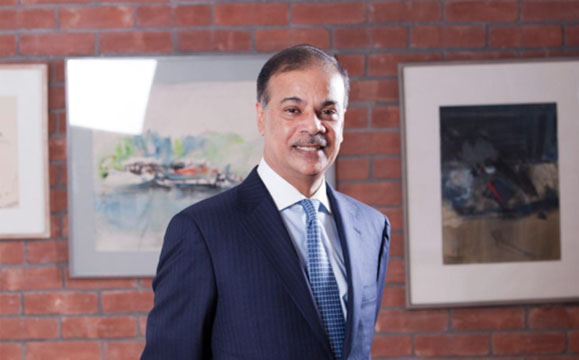Summit Group Chairman Muhammed Aziz Khan Reflects on 26-Year Journey in Serving Bangladesh
By Space Coast Daily // May 21, 2025

When Muhammed Aziz Khan founded Summit Group in 1985 in Bangladesh, few could have predicted it would develop into the country’s largest infrastructure conglomerate. Now, after 40 years in the power sector, Summit Group has established itself as Bangladesh’s largest independent power producer while pursuing regional expansion and sustainable development.
“At that time, the biggest problem was not having electricity, and 20% of
the people had access to electricity in 1995 to 1996,” recalls Khan. “And I am so humbled and so happy that we, at that time, started with electricity and generated electricity. Today, 100% of people have access to electricity in Bangladesh. That I was party to it — that Summit was party to it — is the biggest satisfaction. We have an unwavering commitment to serving Bangladesh.”
From its first independent power plant in 1997, Summit has grown to operate 18 power plants with a total capacity of 2,255 megawatts, representing approximately 17% of Bangladesh’s total private installed capacity.
From Humble Beginnings to Infrastructure Leader
Khan’s journey began in the aftermath of Bangladesh’s independence, when he identified an opportunity within a nation rebuilding itself.
“Bangladesh was newly born and there were no entrepreneurs. So I found a niche,” he says. “There were no importers and exporters, so I started with trading and then moved on to infrastructure as the country needed infrastructure.”
Summit’s growth into a major power producer was driven by Khan’s recognition that electricity was essential for the country’s industrialization and employment generation.
“It was very important for Bangladesh to be able to employ its millions of people. And employment could only come through industrialization,” he says. “We had to move from an agrarian society to an industrial society, and electricity is a fundamental requirement for that.”
In 1997, Summit established Bangladesh’s first independent power plant, Khulna Power Company Ltd, pioneering private power generation in the country. Over the years, the company has developed the first private inland container depot (now Summit Alliance Port Ltd) and one of the earliest nationwide fiber-optic networks.
International Partnerships
A pivotal moment in Summit Group’s development came in 2016 when Khan established Summit Power International in Singapore — a move that enabled access to more financing options and international partnerships.
“One of the most important things that defines us is the fact that we are a Singapore company based out of Singapore and owning assets in Bangladesh,” says Ayesha Khan, SPI’s managing director and CEO. “One of the reasons that we did this structure — and [the International Finance Corporation] helped us to do this structure — is really to help us access the governance of Singapore, the laws of Singapore, and the financial markets of Singapore.”
This repositioning has enabled Summit to attract substantial foreign investment. In 2019, Japan’s JERA Co. acquired a 22% stake in Summit Power International for $330 million. Summit has also formed partnerships with General Electric, Mitsubishi Corporation, and other international firms.
“Working with international financiers brings a high level of due diligence,” says Wu Yan Bin, SPI’s chief financial officer, noting how payment processes involve multiple checkpoints and oversight from lenders’ advisors.
Commitment to Education and Social Development
Throughout Summit’s growth, Muhammed Aziz Khan has maintained a focus on corporate social responsibility, particularly in education. Through the Anjuman Aziz Khan Charitable Trust, which Khan established with his wife, Summit Group provides education to thousands of disadvantaged children in Bangladesh.
“Education is the biggest enabler of equality in the world, and therefore, we focus on how to educate the people around the power plants or around any of our facilities,” Khan says. “I am very pleased to say that we are teaching about 8,000 children in Bangladesh, disadvantaged children who would not otherwise be able to go to school. We help enable them to go to school, and it’s another great satisfaction to be able to be an equalizer in society.”
Summit Group sponsors various education programs, including the Alor Pathshala program operating seven schools in Bangladesh, educating students between the ages of 6 and 16 in hard-to-reach areas for more than 15 years. Khan serves as a trustee of the Prothom Alo Trust that funds this program. The company also provides funding to the Jaago Foundation, which offers English version curriculum in both digital and in-person classes to children from financially disadvantaged homes.Looking To the Future
The journey hasn’t been without challenges. Since 2022, Summit Power International Limited, like other independent power producers in Bangladesh, has faced delayed payments, currency depreciation, and reliance on high-interest loans.
However, Summit has maintained its AAA rating by local credit agencies for over five years and continued to provide cash dividends exceeding 10%. In a recent letter to shareholders, Latif Khan, who became chairman of SPIL in early 2024 after 15 years as vice chairman, noted that profits have rebounded as the exchange rate has stabilized.
Going forward, Summit Group is focused on renewable energy development, with plans to invest $3 billion in clean energy projects across South Asia. This includes 1,000 megawatts of solar and wind generation in India and 700 megawatts of hydropower in Nepal and Bhutan.











